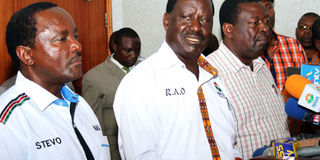‘Computer-generated leaders’ empty talk

Nasa presidential candidate Raila Odinga addresses a press conference at Panari Hotel, Nairobi, on September 17, 2017. He is accompanied by Kalonzo Musyoka (left) and Musalia Mudavadi. Nasa asserts that the IEBC chairman’s account was irregularly used. PHOTO | EVANS HABIL | NATION MEDIA GROUP
What you need to know:
- Nasa alleges that there was no trace of data originating from any polling station to the server.
- Contrary to claims that the IEBC failed to comply with the Supreme Court orders, it duly provided all documents as required.
Following the August 8 General Election, a litany of accusations has been directed at the electoral body with catchy phrases such as “computer-generated leaders” coined in a bid to mask injurious propaganda as facts.
Efforts to enlighten the public about electronic transmission of results or the Kenya Integrated Election Management System (Kiems) have been drowned in endless waves of misinformation.
Having queried the Independent Electoral and Boundaries Commission (IEBC), I declare that there was no technological tampering with result transmission.
AUDIT REPORT
While Nasa claims there were 3,395 failed login attempts to Kiems and 3,851 successful ones, the accusers conveniently omit to state that these were normal system transactions by 341 authorised users.
Further, the Nasa ICT audit report alleges that user accounts were misused by internal and external parties, contrary to IEBC ICT policy, forgetting that returning officers’ accounts were designed to enable them to comply with the transmission standards and other back-end routines.
Indeed, all the system transactions on the Kiems infrastructure and equipment were done by IEBC-authorised users in support of the elections.
WAFULA CHEBUKATI
All transactions were logged and monitored. What Nasa called system “strangers” were, in fact, supplier organisations such as Safran.
Sensationally, Nasa asserts that the IEBC chairman’s account was irregularly used multiple times to transfer, delete and modify files.
On the contrary, as the National Returning Officer, the chairman was a privileged user with administrator permissions, in line with the nature of the transactions, hence the numerous transaction logs.
Files were transmitted through three methods: File Transfer Protocol (FTP) server, email or physical receipt.
RESULTS TRANSMISSION
The Secure File Transfer Server (SFTP) had a public access portal that enabled returning officers to upload forms to the server.
All files received outside the FTP server needed to be uploaded to it.
Incidentally, some forms that were sent would either have missing pages and scan clarity issues, among other concerns, therefore necessitating deletions of previously uploaded files once the proper ones were received.
Nasa alleges that there was no trace of data originating from any polling station to the server but a Kiems kit transmission report shows a data trail down to all of them.
IP ADDRESSES
Only constituencies with transmission challenges sent Forms 34B as email attachments or physically delivered them to the National Tallying Centre, where they were uploaded onto the server.
Another “irregularity” cited was use of multiple Internet Protocol (IP) addresses to access the server.
A hollow argument, considering that to ensure successful transmission of forms users tried various connectivity options, which recorded different IP addresses.
The petitioner said only 277 users accessed the FTP server between August 6 and 17 despite there being more than 40,000 polling stations — again a misapprehension since the server could only be accessed at the constituency level.
INTEGIRTY
Nasa also said forms were renamed and modified in constituencies.
Transmitted forms, however, had to comply with specific naming conventions.
Contrary to claims that the IEBC failed to comply with the Supreme Court orders, it duly provided all documents as required.
In fact, the only additional demand by the petitioner that IEBC (justifiably) declined was provision of its Firewall configuration details.
That would have gravely compromised system security for the IEBC’s ICT infrastructure yet it was still subject to future use.
Mr Njenga, a lawyer, is the secretary-general of the ICT Association of Kenya. [email protected].



